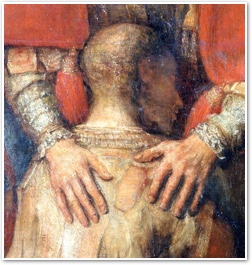Healing the Father Wound
- FATHER DWIGHT LONGENECKER
You have within you a need for a Father that no human father can ever fulfill.
 What was your relationship with your father like? I'll bet it wasn't perfect. That's because your father was human and wasn't perfect, but there is a deeper reason.
What was your relationship with your father like? I'll bet it wasn't perfect. That's because your father was human and wasn't perfect, but there is a deeper reason.
It has to do with the way you're wired. You were designed to need the perfect — I mean absolutely perfect — unconditional and complete love of a Father. In other words, you have within you a need for a Father that no human father can ever fulfill.
This is why so many people grow up and rebel against their fathers or blame their fathers or hate their fathers. They perceive that their father has failed them.
What made me come to this conclusion was speaking to a number of people over the years in counseling who blamed their father for their problems. Then when I looked at the facts objectively I realized that the fathers they were complaining about were actually pretty good guys.
I've had situations where the father was a good Christian man who provided for his wife and family, never cheated on his spouse, loved his kids and spent time with them, but they still blamed him for being a lousy Dad. Of course he wasn't perfect, but my point is that they had this inner, subconscious need for him to be more than he ever could be.
I realize that there are also some truly horrendous husbands and fathers, but I've learned to take all those who complain about them with a pinch of salt. There's always another side to the story, and one's perceptions are never complete. We don't know the whole story.
What I'm getting at is this: I believe we all — to a greater or lesser extent — carry within us something I call the Father Wound. This is the wound we received from not having a perfect father. The wound may be deep and lasting — disabling and poisoning every part of our personality, sexuality and relationships — or it may be less profound, but present nonetheless.
I've had situations where the father was a good Christian man who provided for his wife and family, never cheated on his spouse, loved his kids and spent time with them, but they still blamed him for being a lousy Dad.
How does this wound show itself? It is revealed in a multitude of ways: the person may find it impossible to trust anyone in authority. They may perceive all "father figures" as the enemy. When faced with a "father relationship" at work, in sports, at church (or most anywhere), an ordinarily mature and sensible person may rebel, undermine the "father" or reject him. They may give that person the silent treatment or walk out on him. In other words, they will exhibit immature behaviors — reacting like a child or an adolescent responds to the negative father figure.
The Father wound may reveal itself in distorted sexualities. The genesis of some homosexual conditions are rooted in the search for the loving father. Some immature heterosexual conditions present as the little girl looking for "Daddy". The wound may show itself in a person's inability to accept himself or herself, in poor self esteem, immature rage and aggression towards others … the Father Wound can be at the root of a whole range of other difficulties.
Radical feminists, for example, often rage against "the patriarchal system". To be sure there have always been aggressive and abusive fathers, but to accuse all fathers and all men because of the evil of some is unrealistic and unhelpful. The answer to bad fathers is not no fathers, but good fathers.
How beautiful then, that Our Lord gives us just the one prayer which covers all prayers, and it is the "Our Father". This prayer, when prayed in a deep and meditative manner can heal the Father Wound and all it's nasty symptoms.
Furthermore, all our prayers — indeed the whole Christian life of worship and devotion is patriarchal. In the Catholic Church it is no mistake that the priest is called "father" and the Pope the "Holy Father." The men who bear this role in the family of God all help us in the long journey home to the Eternal Father.
This is the basic story of our faith: all that we do is rooted in our need for reconciliation with the Father. This is also why the parable of the prodigal son is so powerful — because through this story we see the elemental need for the return to the Father.
The Father Wound is healed when there is true repentance and return to the Father. We have to "come to our selves" and return to the Father. Our prayer should be that we experience a profound and life changing experience of the Father's total, unconditional love. That experience will rebuild the foundation level of our lives and from there true health and wholeness will begin to flourish.
 This is Meaghen Gonzalez, Editor of CERC. I hope you appreciated this piece. We curate these articles especially for believers like you.
This is Meaghen Gonzalez, Editor of CERC. I hope you appreciated this piece. We curate these articles especially for believers like you.
Please show your appreciation by making a $3 donation. CERC is entirely reader supported.

Acknowledgement
 Father Dwight Longenecker. "Healing the Father Wound." National Catholic Register (January 31, 2017).
Father Dwight Longenecker. "Healing the Father Wound." National Catholic Register (January 31, 2017).
This article is reprinted with permission from National Catholic Register. To subscribe to the National Catholic Register call 1-800-421-3230.
The Author
 Father Dwight Longenecker serves as the pastor of Our Lady of the Rosary parish in Greenville, South Carolina. Father Longenecker studied for the Anglican ministry at Wycliffe Hall, Oxford and served for ten years in the Anglican ministry as a curate, a chaplain at Cambridge and a country parson. In 1995 he and his family were received into full communion with the Catholic Church. He is the author of more than twenty books including: Beheading Hydra, Praying the Rosary for Inner Healing, Listen My Son: St. Benedict for Fathers, More Christianity, Challenging Catholics: A Catholic Evangelical Dialogue, St. Benedict and St. Therese: The Little Rule & the Little Way, Mary: A Catholic-Evangelical Debate, and The Path to Rome. You can follow his writings, listen to his podcasts, join his online courses, browse his books, and be in touch at DwightLongenecker.com.
Father Dwight Longenecker serves as the pastor of Our Lady of the Rosary parish in Greenville, South Carolina. Father Longenecker studied for the Anglican ministry at Wycliffe Hall, Oxford and served for ten years in the Anglican ministry as a curate, a chaplain at Cambridge and a country parson. In 1995 he and his family were received into full communion with the Catholic Church. He is the author of more than twenty books including: Beheading Hydra, Praying the Rosary for Inner Healing, Listen My Son: St. Benedict for Fathers, More Christianity, Challenging Catholics: A Catholic Evangelical Dialogue, St. Benedict and St. Therese: The Little Rule & the Little Way, Mary: A Catholic-Evangelical Debate, and The Path to Rome. You can follow his writings, listen to his podcasts, join his online courses, browse his books, and be in touch at DwightLongenecker.com.




